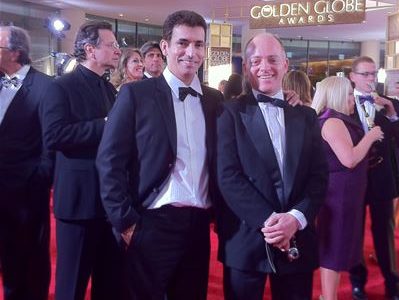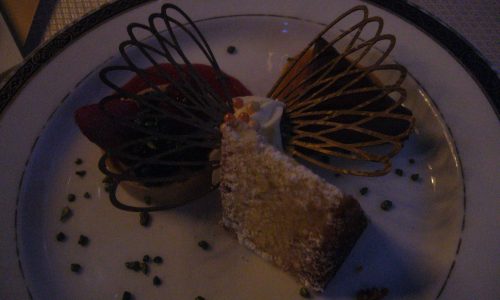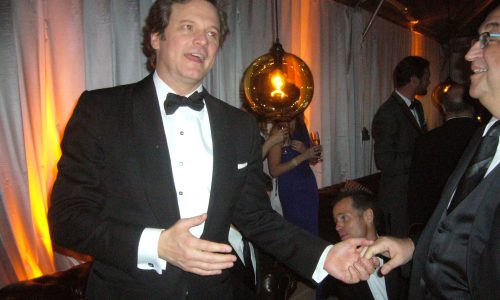Anyone who thinks covering film awards is glamorous clearly doesn’t realise that standing outside for hours, penned in by barriers like cattle, waiting to steal a quick word from ‘the talent’ as they fly past can actually be rather humiliating. Then, herded into a remote press room, we watch the fun on TV screens, waiting for the winners to be brought back for interviews and photos, one by one, brandishing their little gold men, bronze faces or Golden Globes, before they rush back to the party.

It’s very much them and us – the worthy and the worthless. So when Sam Asi, the newest member of the Hollywood Foreign Press Association – a peculiarly privileged group of eighty five foreign journalists, based in Los Angeles – invited me to this year’s Golden Globes as his guest, it was an opportunity I couldn’t miss to find out how the other half live – what it’s like on the other side of the velvet cordon – on the red carpet – and beyond. Sam’s only instruction before I flew out: “Don’t forget your tux.”
Celebrities don’t frighten me. I’ve dealt with them for years on a professional basis, but the idea of socialising with them – well, that’s different, so Sam thought I needed a dummy run. There were two parties the night before the Golden Globes. Disney’s reception on the roof of a West Hollywood hotel had panoramic views across LA and all the food and drink you could need, but held out little prospect for star spotting; with the studio’s main nominated films being Toy Story 3 and Tangled, who was I going to meet? Buzz Lightyear? But the Paramount party, at the infamous Chateau Marmont hotel on the Sunset Strip, was altogether different. It was all I could do to stop myself tugging at Sam’s sleeve. “That’s Mark Wahlberg!” I exclaimed, like a child. When I saw that he was chatting to Jeff Bridges, I almost collapsed. Everywhere you looked were familiar faces – actors including Josh Brolin, Diane Lane and Michael Keaton, directors including Ethan Coen, David O Russell and Paul Haggis, and of course the omnipresent executive producer Harvey Weinstein. As plentiful as the celebrities was the supply of drink and food – both self-serve hot meals and canapés as wide and varied as pizza slices, crab cakes, figs on cream-cheese and, straining to hear the waiter over the music, Sam was confused by the offer of ‘chicken and banana’ – it was, of course, a chicken empanada.
Waiting beside the actress Julie Delpy, in the valet parking line was the first time I really felt like a celebrity myself; across the road, behind barriers, were screaming fans waving cameras and asking for autographs.
By the time I pulled up at the Beverly Hilton hotel in Beverly Hills, somewhere I’ve previously lined the red carpet at the Oscar Nominees Luncheon, I was getting used to valet parking. After having the FBI check the car over and going through airport-style security, Sam and I, in our dinner suits and dickie bows, took our first steps along the red carpet. Journalists and photographers in my usual home to our left and screaming film fans in the bleacher seats to our right, we walked as slowly as we could to savour the moment. The paparazzi didn’t seem to be interested in taking our photos beside the Golden Globe signs. The HFPA official photographers took photos of Sam, and he took mine. Inside the ballroom, I looked for my table – 332 out of 333 – and found it sandwiched between the entrance and the kitchen. Sam sat in the front with other HFPA members and I, and one of Sam’s guests, sat with the French consul general, a budding Russian actress and two publicists from Universal Studios, among others. Having flown all the way from London to attend the Golden Globes, it looked like as usual, I’d be watching the event on TV after all, on the screens scattered around the back of the ballroom. Luckily though, after the first break, Sam got me a seat at his table, closer to the stage and the stars.
There was no time to waste. The waiters swarmed like flies, throwing down eggplant appetizers with red pepper hummus, grilled beef tenderloin and sesame-crusted filets of pacific sea bass and

, whipping our plates away almost before we’d had a chance to finish. Late comers missed out. There was a live show to start.
On the dot of 5pm, the comedian and creator of The Office, Ricky Gervais, stepped out to begin his second successive year as host of the Globes. He opened by joking that practically the only film without 3D characters over the past year was The Tourist – raising the question of how it got three nominations – was it because the members of the HFPA just wanted to spend the evening with Angelina Jolie and Johnny Depp, he wondered. It certainly couldn’t be the fabled bribes, he suggested, because who would see tickets to a Cher concert as a bribe?
After Gervais had dug his comedic claws into more than a handful of Hollywood’s favourites, Christian Bale took the first award of the night, Best Supporting Film Actor, for The Fighter. He claimed not to have known who the Hollywood Foreign Press Association even were before he got the nomination. The next award raised interest on our table. As the name Katey Sagal was announced in the category of Best Actress in a TV drama, two teenagers sitting opposite me screamed “That’s our mom!” and held their breath. “And the Golden Globe goes to… Katey Sagal!” Her son jumped out of his seat and punched the air. Her daughter cried tears of joy.
Ricky Gervais didn’t let up, insulting everyone from the biggest stars – both present and absent – to the president of the HFPA, Philip Berk, who – perhaps ungraciously, responded that if the comic wanted support for a future film, he needn’t bother coming to him. Some of the stars gave as good as they got – at times you almost felt there would be fisticuffs on stage. I wonder whether he’ll be invited back for a third time.
After every couple of awards, commercial breaks gave us time to stretch our legs and fill up our bladders in the bar to our left or empty them in the restrooms to our right. It was also during these moments that the evening was brought back into sharp relief. The Hollywood stars I’d just been watching on the screens were actually in the same room as me, getting drinks from the same bar, using the same toilets. Moments before the award for Best Actor in a Motion Picture Drama was handed out, one of the nominees, Mark Wahlberg, rushed to the men’s room. As he returned to his seat, he didn’t seem to remember me from the previous day’s Paramount party when I accidentally blurted out “Good luck, man.” Accidentally, because – of course – as an Englishman, I felt contractually obliged to support the thoroughly deserving Colin Firth, for his portrayal of King George VI – or King George vee-eye, as the comedian Steve Carrell pronounced it. Our man won.
In the light of some recent developments in the UK’s television industry, some of the acting honours were of particular interest. “Look at who they gave the awards to,” boasted an enthusiastic fifty year old Melissa Leo – the best supporting actress in a feature film for The Fighter. She pointed at Jane Lynch, from Glee, Annette Bening, from The Kids Are All Right, and Katey Sagal, from Sons of Anarchy – all of them in their sixth decade. “I feel nothing if not falsely humble,” joked Lynch as she expressed the glee becoming of her show.
With the fancy food and frocks I couldn’t even begin to describe, the event so far reminded me very much of a grandiose wedding reception – down to the abundance of sometimes humorous but always overlong speeches.
There were three standing ovations – I’m never quite sure whether the audience is standing out of respect, or simply because those at the front stand to clear the passage to the stage and everyone else has to stand up so that they can see. The first was for Al Pacino’s portrayal of the euthanasia doctor Jack Kevorkian in a TV movie. Robert De Niro received a lifetime achievement award, quipping, after seeing his forty year career condensed into three minutes, “I made nothing but hits!” But the biggest ovation was for Michael Douglas, at his first major event since announcing that he has beaten cancer. He handed the Golden Globe for Best Dramatic feature to The Social Network – which surprised Sam, who – having sounded out his HFPA colleagues – had assured director Tom Hooper and executive producer Harvey Weinstein that The King’s Speech would win. He’d now have to avoid them both at the after-parties, where the winners would be parading their trophies, long after the some of the losers had gone home to nurse their wounded pride.

The Golden Globes is an unusual event in that there are several concurrent after-parties at the same hotel, each with its own red-carpet, lined with snappers and journalists, jostling for interviews with the likes of Juliette Lewis, Helena Bonham Carter and of course the party-girl Paris Hilton, as studios opened their post-credit-crisis coffers either to celebrate their success or commiserate their failure. At HBO’s pool party, I enjoyed a second dinner and mingled with the likes of the cast of Mad Men, accepting the hospitality of a rival network. Then it was off to the Weinstein Company’s party, where a beaming Colin Firth accepted congratulations from industry executives for the trophy on the table before him. Having paced it wrong, I had no room to enjoy Harvey’s food. Fox had their party on the neighbouring plot, so they were allowed to use outside caterers. By now, I managed to squeeze in a chocolate fondant and a crispy jam doughnut. Sony and Universal had their parties on the roof. The longest queue was for the Warner Brothers party, which offered the welcome prospect of coffee and cookies, to provide the energy boost you need to make it through to the end of the night.
Where there is celebrity, there is security, and for the first time, I had the right wrist-bands and ultra-violet love-heart hand-stamps to get me past them all. As we left the Weinstein party, Hollywood veteran Dennis Quaid was blocked from entering. The security guard didn’t care who he was or even whether he had a wristband; he was trying to enter the party through the exit. There was a stand-off, a scene as tense and dramatic as any on the big screen over the past year. Who would blink first? I stood and watched, waiting for Quaid to shout “Do you know who I am?” “They let Gene Simmons through this way,” laughed a TV news engineer, rolling up his cables at the end of a long day.
Party-hopping is an odd pastime. You see all the same faces in all the same places. As the night wore on, there were fewer journalists lining the red carpets, betraying the fact that the celebrities were dispersing. But the hangers-on continued to dance, eat and drink. The nibbles, laid temptingly along banqueting tables, made me recall the moment where Mr Creosote is offered one more ‘waffer thin mint’ in Monty Python’s The Meaning of Life. I’d eaten so much food, I felt like I’d explode – or at the very least, spill over the top of my tuxedo trousers – I was stuffed. It was almost heart-breaking – all this wonderful food would go to waste. I knew I’d be hungry the following day and wished I’d filled my pockets, but as Sam kept pointing out to me, for tonight, at least, I was a VIP. VIPs don’t fill their pockets with food to eat the following day.
Returning to Sam’s apartment, with a handful of valet parking stubs, I knew that next time I’d be at the Beverly Hilton hotel, I’d be parking a fifteen minute walk away in a two-hour parking zone, to stand with the journalists on the outside of the cordon, on the edge of the red carpet. Having tasted the celebrity lifestyle, it’s back to the day job.
I’m not entirely sure who is more shallow – the celebrities who swan around at parties or the sycophantic journalists who praise them in order to keep them onside.
With the HFPA, there’s the additional dynamic of having the sycophantic celebrities praising the journalists, in order to keep THEM onside. It’s perhaps the clearest example of the symbiotic relationship at the heart of the entertainment industry. And if nothing else, it was entertaining. And I certainly didn’t go hungry.
